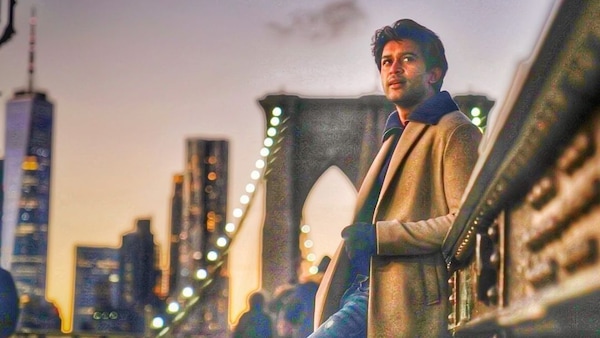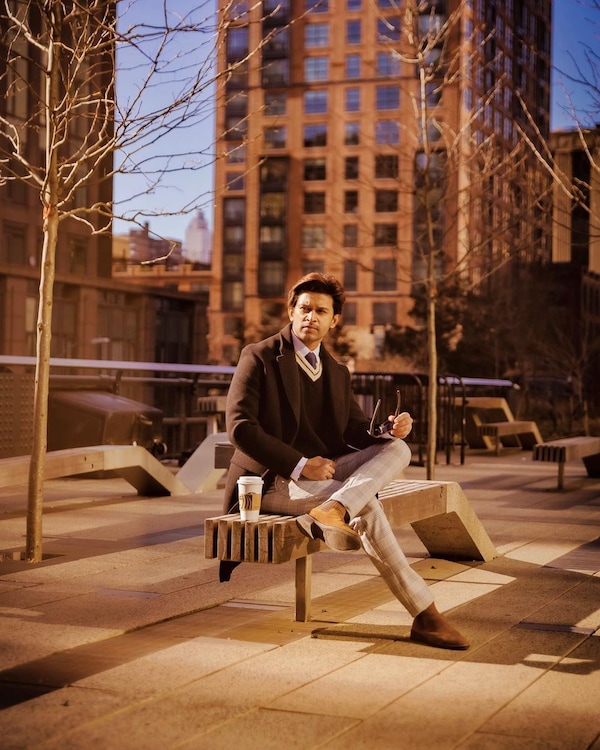Exclusive! Abijeet: I had to unlearn everything I knew to play my part in Modern Love Hyderabad
The Sekhar Kammula find discusses handling the highs and lows of showbiz, his association with director Uday Gurrala for Modern Love Hyderabad and the complexity of modern-day relationships

Last Updated: 02.47 PM, Jul 13, 2022
A career in the entertainment industry is built on the foundation of patience. You need to be firm in withstanding the storms to spot sunshine. The story of Abijeet, the Sekhar Kammula find in Life is Beautiful, is of the guy who hung in there and waited for his moment to arrive.
Not only did he embrace the digital medium earlier than his peers, but fame also came from the most unexpected corner through the Bigg Boss Telugu title win. With a cherry on the cake like Amazon Prime Video’s anthology Modern Love Hyderabad, his transformation feels complete in more ways than one.
Abijeet is now reaping the fruits of his focus and dedication to his craft. In a conversation with OTTplay.com, he takes stock of his eventful career, handling the highs and lows of showbiz and talks of his association with director Uday Gurrala for his segment in Modern Love Hyderabad.
From Life is Beautiful to Modern Love Hyderabad, you’ve come a long way from being the camera-shy boy to a mature gentleman.
Thanks for recognising that and yes, it is the truth of the matter. I had no intention of coming to the industry but it’s a wonderful door that opened up for me. I have enjoyed every bit of it and it has given me so much that I am thankful for.
For someone who had no exposure to the industry, Sekhar Kammula would’ve been your acting school and all your industry lessons would’ve come from him. Didn’t it?
Nobody actually thinks about this and it’s a truth only I know! Sekhar Kammula garu was my introduction to cinema and he set the tone for me. The first endeavour in anything that you take up always sticks with you for a long time to come. He always liked to keep things simple, natural minus dramatisation and over time, I’ve grown to like that kind of filmmaking.
This is where Modern Love Hyderabad comes in, it’s very similar to what I did with Sekhar (sir). Even though there was fictional liberty taken to dramatise the content for viewers, it is still a real-life story (we’ve taken excerpts from NYTimes columns).
We’ve attempted to keep things natural and not try anything fancy. When I saw myself in this role, I realised this is how I would interact or initiate a conversation with someone whom I liked. As much as I say that, I enjoy the over-the-top stuff too, which is the reason we have cinema on the large screen in the first place.
Your character Ashwin, a television producer, is keen on embracing the digital medium and conquering newer frontiers. Incidentally, that’s exactly what most of your industry counterparts are trying to do these days…
I know and, ironically, I got to play the part representing what many around me feel. The industry too is aiming to make things differently, and churn out new-age content that stands out. Regardless of the adjectives that I may throw, it’s all about making organic content that you believe in and making it look equally believable for the viewer.
Conviction is very important if you want to pull off something. If I, myself, say, “There’s no way someone is going to fall for this,” trust me it’s not going to work for anyone. Ashwin, my character too, is trying to bring that change in his career and the industry. He views a standup comedian (Vandana a.k.a Vinnie, played by Malvika Nair) as a conduit for that. She’s fun and innovative and he sees her as a perfect plugin for the TV show he wants to produce.
Does your segment in the anthology suggest that it’s best to not mix business with pleasure?
We’ve tried to showcase that but one must realise we’re all human at the end of the day and things happen inadvertently. Both characters are here honestly to work together and it’s only by chance that they happen to like each other. As much as we try to make that distinction between work and relationships, we realise we aren’t perfect. The story is all about how we deal with that conflict.

The tone of your performance in the short was very today and in tune with the times. Did it have to do a lot with the way Uday visualised your performance?
When I met Uday Gurrala, we first discussed the general emotion of the story and I wanted to know he visualised the situation. It was pretty evident that I had to unlearn everything I knew to make sure the film worked for him. It was interesting that I didn’t have to learn anything new but also had to keep aside everything I’ve learned.
We tried to keep the scenario as close to reality as possible. I was trying to be very normal in everything I do. I had to think about life in the shoes of Ashwin and showed the team the way I was looking at the pitch of the performance. I was asked to tone down my performance further. I always aim for a settled, composed performance. If I am at level one, Uday wants it below zero. (Laughs)
The segment is a humble tribute to late filmmaker Jandhyala’s comic genius too. What comes to your mind when you think of him?
Jandhyala is visual comedy at its best. Certain scenes are set up hinting at the humour that’s to arrive next and you still can’t wait to watch it. He always gives us clues about the ‘comedy of errors’ scenario before and you expect things to explode. Although it’s slapstick, he did comedy like a work of art and was a master of the genre. He charms Ashwin and Vinni as well. Everyone has their own influences at the end of the day. While Ashwin is a hard-core Jandhyala fan, Vinni swears by Jerry Seinfeld.
Frankly, the film is an ode to showbiz even though it criticises its ways and tropes as much.
Yes, and it’s also a reminder to not take life too seriously. If you can joke about yourself publicly, you’re confident about what you’re doing. When Vinni takes a jibe at society and observes the peculiarities of a Telugu abbayi, it’s something to laugh about. In a way, you can’t deny what she says.
Modern Love Hyderabad, as an anthology, throws light on the complexities of a modern-day relationship. Do you think our relationships today are way messier than what they were, say, two or three decades ago?
It’s a tough world today, no two things about that. There are a lot of variables involved. Traditionally, it was about seeing each other, getting married, having a family, going through parenting and becoming grandparents. That’s the way life went for many years. However, we’ve realised there’s so much we could do in life beyond these things and this is interfering with our equation with the special someone. It boils down to personal choice, there are more distractions today for sure.
From Life is Beautiful to the lull phase following it and with Pelli Gola, Bigg Boss Telugu title coming in later, you’ve faced drastic highs and lows over these 10 years. How do you tackle these extremes?
This business is like a sine wave - going up and down - and there’s a mean that goes through it, amidst the highs and lows. I try to stay there as much as possible and remain grounded regardless of success or failure. Accepting success with humility and failure with honesty is key to being happy while you find your way in the industry. It’s a rollercoaster ride and one should handle it carefully. I think I’ve had a great journey, I am very happy and blessed with whatever I’m going through. I can’t wait to see what the future holds for me.
You were much ahead of your counterparts with the digital foray (with Pelli Gola on Viu) though. Was it helpful?
I was happy that my career began with a project shot on ‘film’ and then came the digital age. I did Pelli Gola soon, which I feel was a little ahead of its time. I still think it was a great piece of content. Being in the digital space allows you to experiment all the more. This eventually helps you become a better actor and if you’re constantly in the pursuit of fine-tuning your craft, it’s a great space to be in.
Subscribe to our newsletter for top content, delivered fast.

